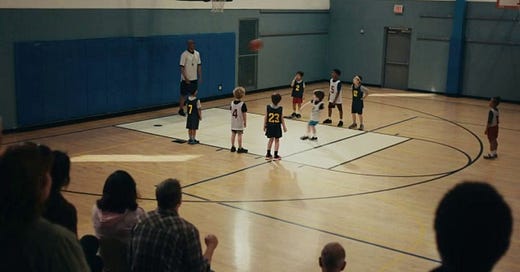Those words of wisdom I had prepared
All seemed to vanish into thin air
-Jens Lekman, “The Opposite of Hallelujah”
I don’t spend much time watching commercials. Not that I ever actively sought them out in the first place, but I tend to spend my time on platforms that keep them to a minimum, and even then, I’ll mute the TV, leave the room, etc. I’m not alone in this, I’m sure.
Over the past few months, though, one of the campaigns that’s managed to poke through my generalized apathy comes from Mattress Firm. There’s a whole series of them, typically organized around a character doing something gross or objectionable, whereupon another person asks them, “how do you sleep at night?” And that segues into the main character claiming that, thanks to Mattress Firm, they’re able to sleep “All Night Long” (the Lionel Richie song enters at this point).
The commercial for their Memorial Day sale takes place at a kids basketball game, and our main character is a woman (mom?) who’s shouting ugly taunts at the boy on the free throw line. Whereupon, etc. etc. The whole thing only lasts 15 seconds, but like I said, it poked through, as I’m sure their ad agency would be happy to hear.
(“How do you sleep at night?” is one of those old-fangled questions that no one actually asks anymore, as we have much more contemporary reasons for struggling with our sleep, whether it’s our brains racing with anxiety and ADHD or the blue light from our screens depriving us of melatonin. The idea that someone might be haunted by their conscience, to the point of sleeplessness, sounds absurdly quaint, like declaring that one has “the vapors.”)
It’s just a joke, I know, but these commercials invite us to identify with the “villains”—we can be shitty as we want to be, because Mattress Firm will help us sleep the sleep of the innocent. (I was watching the Iowa-UCLA game on Friday, and saw one where the main character was blocking the shoulder on a freeway, preventing an ambulance from reaching the site of the accident that had caused a traffic jam. But hey, at least she’ll sleep all night long, I guess?)
I was thinking about these ads when I came across Rob Horning’s latest reflection on the current spate of ads for Apple Intelligence. In the one he describes, the mother uses Ai to throw together an effortless video that distracts her family both from the heartfelt and thoughtful gifts of her children and her own thoughtlessness. She even breaks the fourth wall as she walks away from the scene in slow motion, proud (?) to have salvaged her emotional incompetence.
Visibly annoyed that her daughters took time and thought to make and wrap gifts while she accepted at face value her husband’s demurral that “we said no gifts” — the promise that everybody could be comfortable with doing nothing for each other — the wife is compelled to bring her phone into action to salvage the situation. Typing into a prompt window the same activity her daughter had tried to memorialize with her gift, she gets the phone to make a video of the father teaching it to the kids and smugly presents this as something she made for him. Her family is immediately absorbed in the screen and its facilitation of their narcissism; we see that the video documenting an activity is more important than the activity itself and that the shared experience of watching something is more powerful than other kinds of collective experience.
Horning describes the scene as “astonishingly brazen in its cynicism,” but I’d go even further and describe it as sociopathic. Horning’s entire piece is worth reading. He talks about how the old idea that “it’s the thought that counts,” has been turned on its head by AI. It’s thoughtlessness that is being encouraged, and incentivized, by technology. “The phone is offered as a license to be inconsiderate, and over the past few decades it has been widely accepted as such, no longer a rude thing to bring out or glance away at when someone is talking to you but an inevitability.”
As you might expect this week, Horning turns to this theme as it’s embodied by our recent election. The “normative selfishness” of the Republican ticket has been on display throughout, and apparently, it’s resonated with a majority of voters in this country. We want to be freed from the idea that freedoms come with responsibilities, that there are times where personal sacrifices might be necessary for public welfare, that we are responsible for stepping outside of ourselves on occasion and thinking about how our behavior affects others. It’s hard not to interpret this week’s results as a wholesale, national rejection of the idea of empathy. It’s not simply a rejection, though, but a hard push to the opposite extreme. As Barry Petchesky wrote in Defector, “He ran on a platform of punishing his enemies, and his voters’ imagined enemies, and they turned out in droves to give him that power even at the expense of making their own lives worse1.”
I’ve written quite a bit here about irony over the past couple of years, because I think we’re deep into an age of irony now. Irony is itself neither good nor bad. The ability to see things from another person’s perspective, to accept that one’s own desires might not always be the best guides for policy, or to understand that preserving people’s ability to disagree is vital for democracy—these are features of what I’d describe as a positive brand of irony. I wrote about this a bit in relation to Klein’s Doppleganger; it’s what Arendt describes as the “capacity for internal dialogue and deliberation,” the trick of “making present to my mind the standpoints of those who are absent.”
I’ve written much more about the dark side of irony, where it’s not the thought that counts. It’s hard to be the person who thinks about “we” when surrounded by those who think about “me,” and the latter are far more comfortable choosing a President who won’t call that attitude into question, ever. If you never have to test your beliefs against someone else’s, or admit that your understanding is limited, and you have the personal wealth and power to enforce your corrupt vision of things on the people around you, perhaps it won’t ever occur to you that you’re the villain of the story. You won’t ever have to account for the thousands of people whose lives you’ve destroyed as long as your brand is strong and you’ve surrounded yourself with people who understand that their job, like Socrates’ interlocutors so long ago, is to take whatever you say and reply with a resounding “It must be so!”
That’s really all I have to say about the election, although I expect we’ll be suffering through its aftermath for years (and perhaps generations) to come. To my regret, there’s still a great deal for me to write about how we’ve managed to talk ourselves out of democracy in this country. So I guess I ought to get to it.
Honestly, I don’t know how else to explain how more than 10% of Missouri voters (to take just one example) both voted to overturn their state’s abortion ban while simultaneously backing candidate(s) who are explicitly in favor of implementing that policy nationally.






I saw the smartphone ad offering distraction as a tool for getting away with being detached from one's family, and the mom being flippantly smug about it, with even a flash of ironic awareness for all of us to partake in. I saw an election, with distraction as a tool for getting away with being detached from one's community, and being flippantly smug about it, but I'm not sure that the smugly flippant of the participants have awareness of what's been gotten away with. Maybe when there's nobody to pick cucumbers and strawberries, and the trucks go away empty and the shelves are less vibrantly full, and folks get an un-bellyful of what inflation really looks like. But prob'ly not. We've been acculturated at being aggrieved over what we CAN'T have for too long.
As most people who know me are aware, I've long found insight and renewal from being on road pilgrimages on unlikely machines going on two wheels. So, no surprise, I came upon a short, home-prepared video clip of a guy in his late fifties, who quietly acknowledges he's come through a hard period of life, implying, without saying, that it entailed a loss comparable to the untimely passing of a partner or family member. He heads north to the North Yorkshire Pennines from London on an entirely unlikely motorbike (under 20 hp, a single-cylinder bike of less than 300#), back roads and smallish towns, good weather and otherwise. And in 13:32 minutes of film, he appears to have found his way home. You can see a smartphone clipped to his handlebars with route directions. To my point:
The Apple 'mom' in the commercial has utilized the 'power' of her device to snooker and separate herself from the people that have loved and supported her, while winking at us that we could get away with snookery and taking advantage, too. All for a subscription and low, low monthly fee. The self-acknowledgedly wounded Old Guy on the Yamaha 125 followed the maps on his device to find himself and his 'way back home'. While I'd suggest leaving the damn thing behind next time, and carrying a film camera, a pencil and a journal, following paper Ordnance Survey Maps, his pilgrimage with the device offers a way to find our way home. Her example offers a way to wreck one.
Welcome to her version of the future.
Insightful piece, Mr. Brooke. Thanks